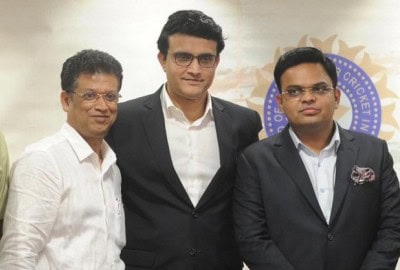By Qaiser Mohammad Ali
New Delhi, Dec 2 : A final verdict on the impending reforms of Indian cricket is still seemingly some way away, as at the next hearing on December 9, the Supreme Court will only hear issues that could be resolved in High Courts, besides internal disputes between state cricket associations and their members and membership.
Some media reports claimed that the December 9 hearing would be the final one, and that a judgement on the controversial tenures of Indian cricket board president Sourav Ganguly and secretary Jay Shah would be pronounced thereafter.
The fact is that, while hearing a petition of the District Cricket Forum, Kulgam, Jammu and Kashmir, against the Jammu and Kashmir Cricket Association, on Tuesday, a bench comprising Justice L. Nageswara Rao and Justice Hemant Gupta ordered this case to be listed along with the original case pertaining to reforms of the Board of Control for Cricket in India (BCCI) — civil appeal No.4235 of 2014.
P.S. Narasimha, amicus curiae in the case and senior advocate, indicated that it would take more than one hearing to close the case, before a judgment is pronounced.
“On December 9, only a part of it will be over, and sometime after that will be the final hearing,” Narasimha told IANS on Wednesday.
“On December 9, the issues that can be resolved by the High Courts will be heard — the intra-state disputes of the state cricket associations and all that. It will not be so much about the states’ constitutions; it will be about some members not being allowed [into the association], some members being thrown out [of the associations]; members’ grievances etc,” he said.
Narasimha also said that only some of the many interlocutory applications, which have been filed in the BCCI reforms case and which could be decided by the High Courts, would be heard on December 9.
Many state cricket associations and individuals have filed interlocutory applications in the case that have been clubbed together and are being heard.
The BCCI wants some of the most important reforms, suggested by the SC-appointed Lodha Committee and approved by the apex court, changed. These mainly include scrapping of the mandatory cooling-off periods of three years for the BCCI office-bearers after every three years in chair; the maximum tenure for office-bearers is of nine years at the BCCI, besides nine years at state associations.
BCCI treasurer Arun Singh Dhumal had filed an application seeking several reliefs on April 21. But the Supreme Court has not ruled conclusively so far, partly due to the Covid-enforced lockdown during which the courts were also closed for a long time; even now hearings are taking place virtually.
The terms of Ganguly and Shah, as per the approved/registered BCCI constitution, got over a few months ago, but they are continuing to be in power as they are waiting for court directions. Even the tenure of joint secretary Jayesh George is said to be over, but he too is apparently waiting for a court ruling on Ganguly and Shah that will also apply to him.
Two former Supreme Court Chief Justices have pronounced historic judgements in the BCCI case. Justice TS Thakur had pronounced the first judgment on July 18, 2016, and then Justice Deepak Misra pronounced another judgment August 9, 2018. But while the BCCI constitution has been registered under the societies act, many people, including Ganguly and Shah, are seeking amendments in it.
Former SC Chief Justice Rajendra Mal Lodha, who headed a three-member committee that suggested unprecedented reforms, is heart-broken at the attempts being made to derail the work his panel had done diligently. These reforms, if finally approved by the Supreme Court, have the potential to trigger reforms the other sports bodies of the country as well.
“There has been a lot of tinkering right from day one in lots of things, like one state-one vote, the composition of the apex council, the cooling-off period etc. We gave a full package for reforms. The soul of the reforms may not be in the same form, but certain significant reforms continue; certain significant reforms have been affected or obliterated. Strictly speaking, the soul in its pure form is not there; impurities have crept in,” Lodha has observed.
Disclaimer: This story is auto-generated from IANS service.

